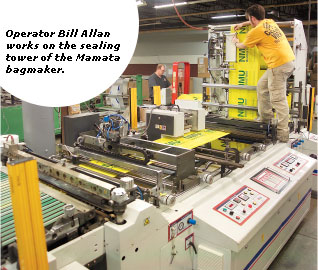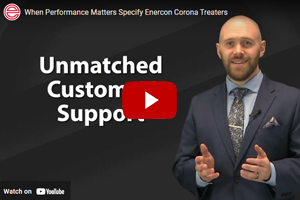A Mixed Bag
- Published: October 01, 2007, By By Edward Boyle, Contributing Editor
Bag Making
The operations manager of Clear View Bag, Todd Romer, admits that with dozens of distributors serving the company’s hundreds of customers across the US, “Sometimes we don’t know where our stuff is going.” But the Albany, NY-based converter clearly has the equipment and experience to get it there—and fast.
While Clear View averages a three-to-four-week turnaround on typical orders of its full line of stock bags, reclosables, pallet covers, liners, sealers, tubing, and construction film, it also can have material in the hands of its ultimate customer overnight with a “make and hold” program and in just days “from scratch.” Romer explains that since the company typically converts 40-50 orders a day, one or two more won’t hurt.
He credits Clear View’s broad range of printing and bagmaking equipment. It includes 17 bagmaking machines and six flexographic printing presses with up to eight colors in widths to 55 in. The company recently installed a 42-in., eight-color Comexi flexo press that enhances its ability to print process color work and speeds set-up times with sleeve technology.
“We’ve moved up ten years in technology with the Comexi press,” explains Romer. “Instead of setting up and moving in big expensive cylinders for every job, it conservatively cuts our set-up time in half.”
All Types of Bags
Clear View also enhanced its bagmaking capabilities with new machines from Mamata, an India-based company with a Chicago facility that is making major inroads into the US market. The company installed its first Mamata Universal Vega machine last September and the second in April.
In explaining his decision to purchase Mamata equipment, Romer says, “This machine can do all types of bags, so one machine is versatile enough to do anything on our line, whereas a lot of our machines are specialized, and that creates bottlenecks.
“If I only have one or two machines that can do a certain type of business, we have to either turn some away or lead times get out of hand. But when you have a machine like the Mamata and you’re able to filter any bag through it, it gives you a lot of versatility.
“We’ve purchased a second Mamata when we found that we were not able to use the first one to its fullest capacity because we found two or three pieces of business that we really just have to put through that machine, mostly patch handles. It kind of worked against us, so we decided that in order to free up that machine to be versatile, we would need another one next to it. We feel that with this second machine, we may be able to eliminate two or three others.”

The Mamata machine’s ten-minute changeover also appealed to Romer, since the company has carved a niche as a small-run provider of as little as 3,000–5,000 bags/run. The new machine has been particularly useful in producing short-run polyethylene (PE) retail bags for trade shows and numerous bookstores nationwide.
Operator Marc Williams sets up the older Mamata in the foreground, while the newest bagmaker runs in the background.
“That’s one of the things that sets us apart from the competition,” notes Romer. “We’re able to meet a market niche of small runs with high quality and big-time service. We do a lot of work that other people won’t even sniff at. That would be our niche. If you are looking for 500,000 bags, we’ll do that, but we’re much more competitive and much more attracted to the people who are looking for 5,000, 10,000, or 20,000 bags.”
Family Business, Family Values
Most importantly, says Romer, Clear View is able to do so because it continues to adhere to the core values that were passed down from his father and his grandfather before him, which have sustained the company’s success in manufacturing and distributing PE, polypropylene, high density PE, and related packaging products.
Bill Romer, Todd’s father, bought the business from his father-in-law, Donald Strevel, in 1968. As majority owner, Bill still is a full-time, actively involved employee. His dedication to customer service and product quality is aptly summed up in Clear View Bag’s concise mission statement: To provide products of excellent quality and consistency, delivered when expected, and priced competitively, while providing exceptional customer service and support.
“We are a manufacturer, but we tell our customers that we’re in the service business,” says Todd Romer, who along with his brother, Trent, and cousin, Joe, head the two-plant operation that was established in 1961. The second, 35,000-sq-ft converting facility is in Thomasville, NC, and was added in 1997.
Todd Romer says that although Clear View does work closely with a select number of major accounts that insist on dealing directly with the supplier, it won’t tamper with the success it has enjoyed by foregoing an in-house sales force and working instead through its network of distributors. “Our distributors are experts in the field,” he says, “and a new custom program that we put in place about a year ago allows us to do everything electronically. Turnaround time is nullified.
“Our updated website is up and running, and we’re taking orders from customers. This concept certainly makes it easier to deal with us. All our stock bags can be purchased online and customers can create custom quotes and ask questions online.
“I want to do anything I can to make things easier for my customers. It’s too easy these days to find someone else to do your work, so we just go out and do our work as well as we can.”
CONVERTER INFO:
Clear View Bag Co. | 5 Burdick Dr., Albany, NY 12211 | 518/458-7153 | clearviewbag.com
SUPPLIER INFO:
- Mamata USA | mamatausa.com | PFFC-ASAP 301
- Comexi North America | comexi.com | PFFC-ASAP 302
-
Contributing editor Edwad Boyle, based in Reading, PA, has covered the converting industry for more than 23 years. Contact him at EJB Communications; 610-670-4680; ejbcomm@aol.com.








